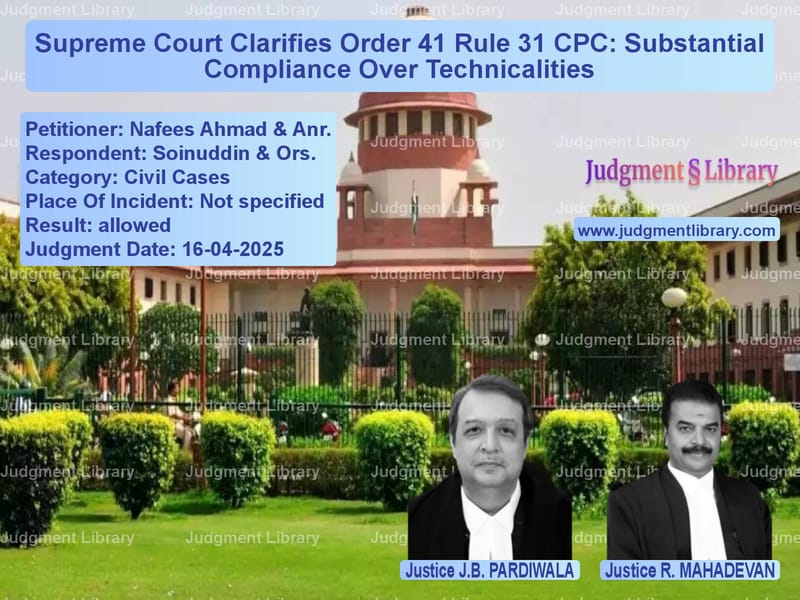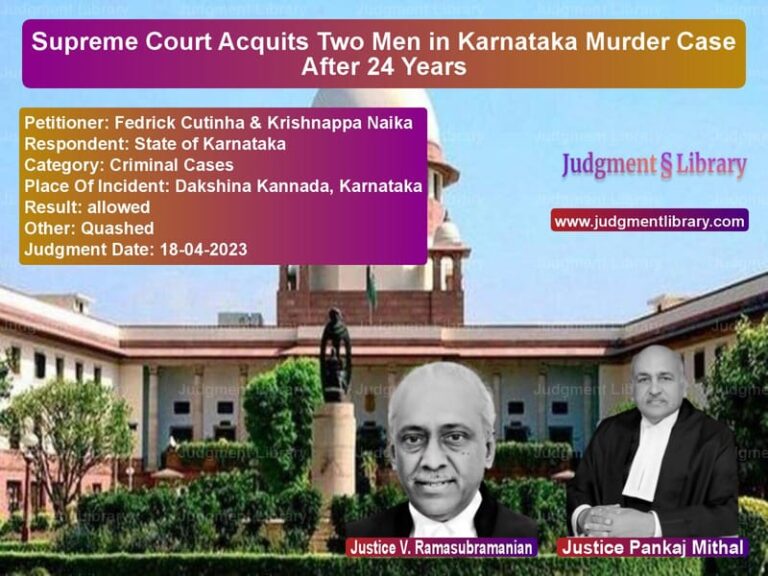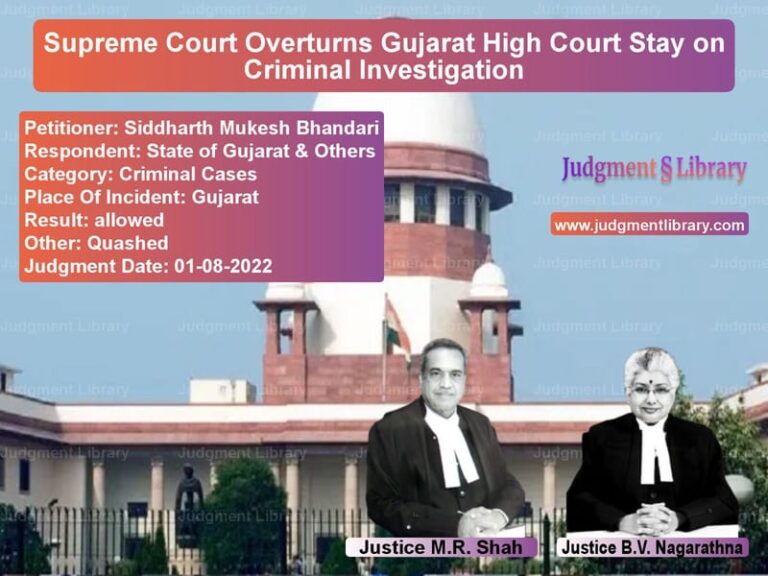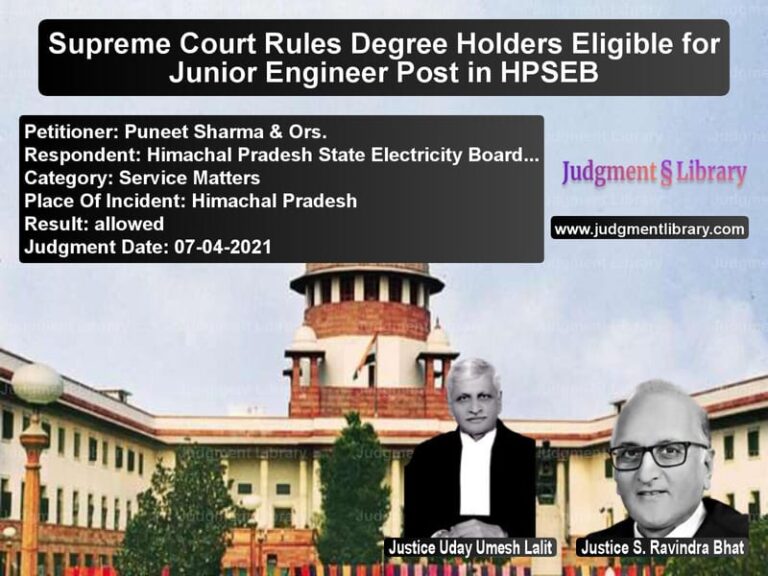Supreme Court Clarifies Order 41 Rule 31 CPC: Substantial Compliance Over Technicalities
In a significant judgment delivered on April 16, 2025, the Supreme Court of India addressed the interpretation of Order 41 Rule 31 of the Code of Civil Procedure (CPC) in the case of Nafees Ahmad & Anr. vs. Soinuddin & Ors.. The Court overturned the Allahabad High Court’s decision, which had remanded the matter to the First Appellate Court for non-compliance with Order 41 Rule 31 CPC. The Supreme Court emphasized that procedural rules should facilitate justice rather than hinder it, and substantial compliance with Order 41 Rule 31 is sufficient.
The Facts of the Case
The dispute originated from a civil suit, the details of which were not extensively discussed in the Supreme Court’s order. The First Appellate Court had decided the appeal without explicitly framing points for determination as required under Order 41 Rule 31 CPC. The High Court, in its judgment dated September 4, 2017, held that this omission vitiated the First Appellate Court’s judgment and remanded the matter for fresh consideration. The High Court framed the following substantial question of law: “Whether it is incumbent upon the Appellate Court to frame the point of determination as per the provisions of Order 41 Rule 31 CPC while deciding the first appeal or not?”
Supreme Court’s Analysis
The Supreme Court disagreed with the High Court’s rigid interpretation of Order 41 Rule 31 CPC. The Court relied on its earlier decision in G. Amalorpavam And Others v. R.C. Diocese of Madurai And Others (2006) 3 SCC 224, where it was held that the provisions of Order 41 Rule 31 CPC are directory and not mandatory. The Court observed:
“Non-compliance with the provisions, by itself, may not vitiate the judgment and make it wholly void and may be ignored if there has been a substantial compliance with it.”
The Court further elaborated on the purpose of procedural rules, citing the Privy Council’s decision in Mt. Fakrunisa v. Moulvi Izarus (AIR 1921 PC 55) and a three-judge Bench decision in Thakur Sukhpal Singh v. Thakur Kalyan Singh and Anr. (1963) 2 SCR 733. The Court reiterated that the primary duty of an appellate court is to ensure justice, and overly technical interpretations of procedural rules should be avoided. The Court quoted from Sangram Singh v. Election Tribunal, Kotah, Bhurey Lal Baya (1955) 2 SCR 1:
“Now a code of procedure must be regarded as such. It is procedure, something designed to facilitate justice and further its ends… Too technical construction of sections that leaves no room for reasonable elasticity of interpretation should therefore be guarded against (provided always that justice is done to both sides) lest the very means designed for the furtherance of justice be used to frustrate it.”
Key Legal Principles
The Supreme Court’s judgment clarified several important legal principles:
1. Substantial Compliance: The Court held that Order 41 Rule 31 CPC does not require strict adherence to its provisions. As long as the appellate court’s judgment reflects a reasoned decision on the issues raised, the absence of formally framed points for determination does not render the judgment void.
2. Role of Appellate Courts: The Court emphasized that the appellant must first demonstrate errors in the lower court’s judgment before the appellate court is obligated to address specific points. The Court cited Thakur Sukhpal Singh to reinforce this principle:
“It is the duty of the appellant to show that the judgment under appeal is erroneous for certain reasons and it is only after the appellant has shown this that the appellate court would call upon the respondent to reply to the contention. It is only then that the judgment of the appellate court can fully contain all the various matters mentioned in Rule 31, Order 41.”
3. Discretionary Reference to Proceedings: The Court referred to Order 41 Rule 30 CPC, which allows appellate courts discretion in referring to lower court proceedings. The Court noted that if the appellant fails to raise any substantive issues, the appellate court can dismiss the appeal without extensive references.
Conclusion
The Supreme Court allowed the appeal and set aside the High Court’s order, restoring the First Appellate Court’s judgment. The Court’s decision reinforces the principle that procedural rules should serve as tools for justice, not obstacles. By prioritizing substance over form, the judgment ensures that technicalities do not undermine the merits of a case.
This ruling is particularly significant for civil litigants and practitioners, as it provides clarity on the interpretation of Order 41 Rule 31 CPC and reduces the risk of remands based on procedural technicalities. The Court’s reliance on precedent and its focus on the broader objectives of justice make this judgment a valuable reference for future cases involving procedural compliance in appellate proceedings.
Petitioner Name: Nafees Ahmad & Anr..Respondent Name: Soinuddin & Ors..Judgment By: Justice J.B. PARDIWALA, Justice R. MAHADEVAN.Place Of Incident: Not specified.Judgment Date: 16-04-2025.Result: allowed.
Don’t miss out on the full details! Download the complete judgment in PDF format below and gain valuable insights instantly!
Download Judgment: nafees-ahmad-&-anr.-vs-soinuddin-&-ors.-supreme-court-of-india-judgment-dated-16-04-2025.pdf
Directly Download Judgment: Directly download this Judgment
See all petitions in Judgment by J.B. Pardiwala
See all petitions in Judgment by R. Mahadevan
See all petitions in allowed
See all petitions in supreme court of India judgments April 2025
See all petitions in 2025 judgments
See all posts in Civil Cases Category
See all allowed petitions in Civil Cases Category
See all Dismissed petitions in Civil Cases Category
See all partially allowed petitions in Civil Cases Category







